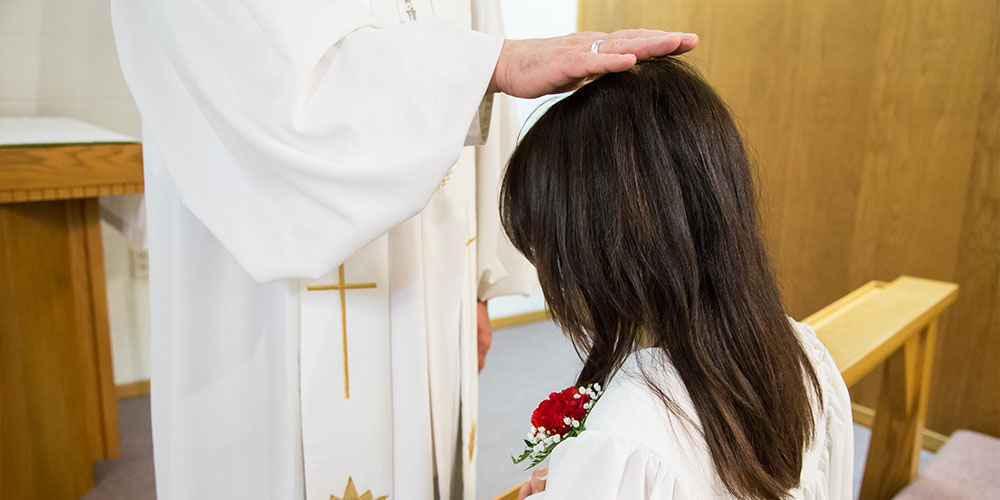 |
Confirmation is a rite of passage for many confessional Lutheran young people. Yet as important as their confirmation day is, most would agree that it’s the years leading up to that day that really mattered—and all the days that follow as they live out their confirmation promises. So how can parents impress upon their children that the importance of confirmation goes beyond the ceremony and the party afterward?
Nicole Balza

On my dresser sits a wooden plaque, painted purple, with the words of my confirmation verse inscribed in permanent marker. My youngest child made it for my birthday years ago. Seeing it makes my heart glad, not just because the verse holds special meaning to me but because—thank God—my children grasp that too!
A pattern set early
Since the day our oldest was born, my husband and I have striven to make it clear that Jesus is Lord in our lives and our love for him is what drives us. Now that she has been in catechism class for the past two years, we are so thankful for the partnership with our pastors as they guide her through the truths of God’s Word succinctly laid out in Luther’s Catechism. As she reads the series of questions and answers found in the catechism (the answers always being God’s very words), she is learning to find the answers to life’s tough questions in the right place: God’s Word.
As we look forward with her to high school and beyond, we’ve talked about how we fully expect for life to get tougher, questions to get harder, stressors to take their toll, and doubts to creep in. That’s why we’re stressing the importance of catechism class now. Now is the time for her to practice the skills of relying on God and finding her answers in the book of absolute truth.
It’s an exciting time! She comes home relaying discussions about life issues (some awkward, uncomfortable, or controversial) with pastors and peers through the lens of faith. She has been learning to defend the faith she was gifted at her baptism. She is in the process of choosing her confirmation verse—the verse that she’ll reflect on throughout her life as she looks back on the day when she stood up in front of our congregation to confirm that she really does believe the Bible and to ask God to help her stay in the faith for her whole life.
A pattern continued
As much as is in our control as parents, we’ll surround her with people (caring Christian family and godly teachers and friends at our area Lutheran high school) and resources (devotionals, podcasts, Christian music, and books on apologetics or Christian living) to help her grow in her faith. And, of course, we’ll walk alongside her: attending the Lord’s Supper, serving at church, and continually growing in the grace and knowledge of our Lord and Savior Jesus Christ. Confirmation is not just the end of catechism class but the beginning of her adult walk of faith!
Laura Schaefer
It’s said that in most cases our children will love what we teach them to love. Love the Packers? They’ll learn to love the Packers too. Love the Vikings? That’s whom they’ll learn to love. So how can we teach them to love what matters most? How can we teach them to love Jesus in response to his great love for us?
Martin Luther wrote the Small Catechism as a summary of the truths of the Christian faith. He intended it to be a tool for parents to teach their children, an idea God put forth in Deuteronomy 6:6,7: “These commandments that I give you today are to be on your hearts. Impress them on your children.” That’s exactly what we’re doing with catechism instruction: We’re impressing the truths of God’s Word on our children. How do we do that best? I would suggest three ways:
- Start early. The Simplified Catechism is appropriate for younger children. My First Catechism will lay the groundwork as they get older and build upon the basics. Northwestern Publishing House also offers a free catechism Bible study to help you review the truths of God’s Word as an adult.
- Review the catechism often. Read a page or two after dinner or before bed. An old maxim says, “Repetition is the mother of learning.” What starts as rote recitation will lay the groundwork for a deeper understanding of God’s Word as the catechism “puts handles” on biblical doctrines.
- Get help. If your child attends a Lutheran grade school, catechism instruction is a part of the weekly instruction. If you homeschool or your child attends public school, bring him or her to church when catechism classes are offered. Either way, support pastors and teachers by helping your child complete assignments and review memory work. Discuss the lessons with your child.
One hundred years from now, it won’t matter if your kids were Packers or Vikings fans or if they became rocket scientists or doctors. The only thing that will matter is that you are all together forever with Jesus. Support your children in faith-building activities that encourage that relationship with their Savior.
Rob Guenther
Learn more about the resources mentioned in this article. The Simplified Catechism and the free catechism Bible study are available at nph.net. My First Catechism is available at cph.org. Read more about different ways congregations conduct catechism classes.
Author: Multiple authors
Volume 111, Number 05
Issue: May 2024
A prayer for the confirmands in your life
As part of the Rite of Confirmation in Christian Worship, the pastor leads the congregation in this prayer for the confirmands, which could also be used as a personal prayer for a confirmand you know.
Gracious Father, in Holy Baptism you created faith in the hearts of these young people and gave them a new birth as members of your family. Help them remember their baptisms every day and find comfort in your promise that you will never leave them or forsake them.
Give them strength to put down and drown the sinful nature that lives within them so that each day their faith may triumph in their living and loving and in their words and actions.
Lead them to see and believe that in the word of the gospel they find forgiveness for their sins and relief for their guilt. Use the remembrance of your commandments to drive them to the comfort of the gospel and then to guide them as they live for you and others.
Protect them from Satan when he tempts them to be careless with your Word and sacrament, to make plans for this life and not for the life to come, or to find popular theories more appealing than your truth.
Empower them by the gospel of your Son to live in their world with kindness, humility, and patience that others may see their good works and glorify their Father in heaven.
Help us provide fitting examples of faithfulness to your Word and sacraments. Lead us to encourage and admonish them in wisdom and love even after they have left our homes and made new homes for themselves.
When the end comes and we all stand before the judgment seat of Christ, have compassion on us despite our sins and accept us as eternal dwellers in your royal rooms, through the merits of Jesus our Savior, who became sin for us so that in him we might become the righteousness of God.
Reprinted from Christian Worship: Agenda by permission of Northwestern Publishing House.
- Parent conversations: How can parents and kids manage stress?
- Parent conversations: What do your prayers for your children include?
- Parent conversations: How do we resist making our parenting law-based?
- Parent conversations: What Bible passages do you turn to most as a parent?
- Parent conversations: How can we help kids develop positive, healthy habits?
- Parent conversations: What tactics do you use to encourage children to tackle difficult tasks?
- Parent conversations: How can we model good listening skills for our kids?
- Parent conversations: How do we help our kids move on from mistakes?
- Parent conversations: How can we instill gratitude in our children?
- Parent conversations: How can parents find the balance between being too restrictive and too permissive?
- Parent conversations: How can we teach kids to be good friends?
- Parent conversations: What life skills will help young people as they transition to adulthood?
- Parent conversations: How do we discuss death with our children?
- Parent conversations: What does it look like for a father to be a strong Christian leader?
- Parent conversations: How can we help young adults stay engaged in the church?
- Parent conversations: What do parents need to know about video games?
- Parent conversations: How do parents not let worry get the best of them?
- Parent conversations: How do we teach our kids to value all people?
- Parent conversations: When parenting philosophies differ
- Parent conversations: How can we help today’s overwhelmed teens?
- Parent conversations: How can parents maintain a healthy marriage?
- Parent conversations: You might be a Lutheran parent if . . .
- Parent conversations: Parenting post–high school: What is a parent’s role?
- Parent conversations: How can families use the hymnal in their worship life at home?
- Parent conversations: What should Christian parents teach their children about gender?
- Parent conversations: What is vocation? How does it apply to parenting?
- Parent conversations: Why do siblings fight? How should I react when they are fighting?
- Parent conversations: How do we teach children resilience?
- Parent conversations: How do I approach vaccines as a Christian parent?
- Parent conversations: How can I explain the Sixth Commandment to a young child?
- Parent conversations: How can I help my child have an optimistic outlook?
- Parent conversations: What if we can’t follow our Christmas traditions this year?
- Parent conversations: What are ways to foster a rich prayer life in children?
- Parent conversations: How can I let the gospel shine as I parent?
- Parent conversations: How should I handle a child’s separation anxiety?
- Parent conversations: How should families prepare to go back to school?
- Parent conversations: How does a teen’s brain work?
- Parent conversations: How much should I monitor my child online?
- Parent conversations: How can parents reassure children during an uncertain time?
- Parent conversations: How can I stay calm when my child is out of control?
- Parent conversations: Should I give something up for Lent?
- Parent conversations: How can I keep my child engaged in attending church?
- Parent conversations: How can we help a stressed-out kid?
- Parent conversations: How can we nurture a proper view of “stuff”?
- Parent conversations: How involved should parents be in a child’s homework?
- Heart to heart: Parent conversations: Are we modeling kindness for our children?
- Heart to heart: Parent conversations: What’s the best parenting advice you’ve received or given?
- Heart to heart: Parent conversations: How should we handle it when people undermine our parenting decisions?
- Parent conversations: How can we prepare children for summer camp?
- Heart to heart: Parent conversations: What’s a parent’s role as a child dates?
- Heart to heart: Parent conversations: How do parents find contentment?
- Heart to heart: Parent conversations: How can we help a family with a sick parent?
- Heart to heart: Parent conversations: How can parents model healthy cell phone use?
- Parent conversations: How can we protect kids without scaring them?
- Parent conversations: What does your family’s bedtime routine look like?
- Parent conversations: What do I need to consider before I give my child a cell phone?
- Parent conversations: How can we teach gentleness and strength at the same time?
- Parent conversations: What should we do when our children grow silent?
- Parent conversations: What should we teach our children about the Reformation?
- Parent conversations: Why should children obey their parents?
- Parent conversations: How does a parent’s role change over time?
- Parent conversations: How should I handle a disagreement with my child’s teacher?
- Parent conversations: What are the building blocks of a strong parent/child relationship?
- Parent conversations: What is our goal as parents?
- Parent conversations: What Christmas traditions do you cherish in your family?
- Parent conversations: How can we raise a generation that cherishes life?
- Parent conversations: What are the best Bible story books for family devotions?
- Parent conversations: Do we want our children to be leaders or followers?
- Parent conversations: How can parents reinforce the importance of confirmation in their child’s life?









